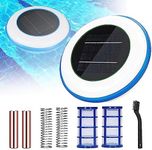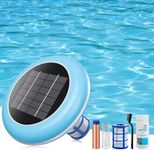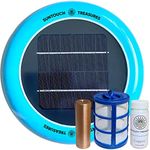We Use CookiesWe use cookies to enhance the security, performance,
functionality and for analytical and promotional activities. By continuing to browse this site you
are agreeing to our privacy policy
Best Solar Pool Ionizer
From leading brands and best sellers available on the web.#2

ATYBO
10%OFF
Solar Pool Ionizer, Come with 2 Copper Anodes Replacement, More Lasting Solar Copper Pool Ionizer Effective Up to 45,000 Gallons, for Outdoor Above-Ground Fresh and Salt Water Pools
View Product
#3

Remington Solar
Remington Solar Chlorine-Free Sun Shock & Water Purifier | Reduces Chlorine Usage by up to 90+ Percent | Tested up to 22,000 gallons
View Product
#4

IXART
Solar Pool Ionizer | Up to 85% Less Chlorine | Solar Pool Copper Silver Ionizer | Pool Cleaning Device | Longer-Lasting Anode | Up to 35,000 Gallons
View Product
#5

VOKPIT
Solar Pool Ionizer System,Copper Ionization,Floating Automatic Water Cleaner and Purifier,Up to 35,000 Gal,85% Less Chlorine, Chlorine Free Water,Smart Replacement
View Product
Buying Guide for the Best Solar Pool Ionizer
Choosing a solar pool ionizer can make maintaining your pool easier and more eco-friendly. These devices use solar energy to release ions into the water, which help control algae and reduce the need for chemicals. When picking the right solar pool ionizer, it's important to understand the main features and how they relate to your pool's size, usage, and maintenance preferences. By focusing on the key specifications, you can find a model that keeps your pool clean with minimal effort.Pool Size CompatibilityPool size compatibility refers to the maximum volume of water the ionizer can effectively treat. This is important because an ionizer that's too small for your pool won't keep the water clean, while one that's too large may be unnecessary. Pool size is usually measured in gallons or liters. Small ionizers are suitable for above-ground or small in-ground pools, while larger units are designed for big in-ground pools. To pick the right one, check your pool's capacity and choose an ionizer rated for at least that size.
Ion OutputIon output indicates how many copper or silver ions the device releases into the water, which directly affects its ability to control algae and bacteria. Higher ion output means faster and more effective sanitization, but too much can lead to staining or other issues. Ion output is often measured in milligrams per hour. For lightly used or smaller pools, a lower output is usually enough, while larger or heavily used pools benefit from higher output. Match the ion output to your pool's needs for best results.
Solar Panel Size and EfficiencyThe solar panel size and efficiency determine how much sunlight the ionizer can convert into energy to power the ionization process. Larger or more efficient panels work better in areas with less direct sunlight or for longer daily operation. If your pool is in a sunny spot, a standard panel will suffice, but if you have partial shade or want maximum performance, look for a larger or more efficient solar panel. Consider your local climate and pool location when making your choice.
Electrode Material and LifespanThe electrode is the part of the ionizer that releases ions into the water, and its material and lifespan affect both performance and maintenance. Common materials include copper, silver, or a combination. Copper is effective against algae, while silver targets bacteria. Lifespan is usually measured in months or years of use. If you want less frequent maintenance, look for longer-lasting electrodes. If you have specific concerns about algae or bacteria, consider the electrode material that best addresses your needs.
Maintenance RequirementsMaintenance requirements refer to how often you need to clean or replace parts of the ionizer, such as the electrode or filter. Some models need cleaning every few weeks, while others can go longer between maintenance. If you prefer a low-maintenance option, look for models with self-cleaning features or longer intervals between required upkeep. Think about how much time you're willing to spend on pool care when considering this specification.






